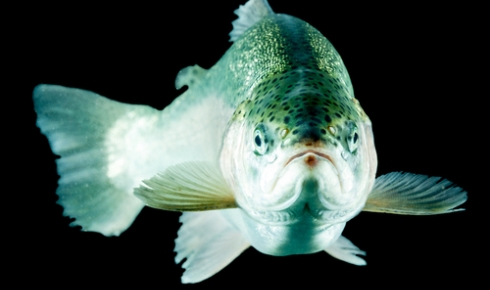Three-second memory? Sounds fishy

The welfare of the seafood we eat is under studied, but research suggests fish may 'feel' more than we think
The Biologist 63(4) p10
Animals' sentience and cognitive abilities, together with their degree of consciousness, have been debated by biologists for centuries. What do animals perceive, feel and know?
Even less is known about fish. They have evolved in many different forms in different habitats, with their sensory systems evolving in various ways. As terrestrial creatures, we can't imagine what it means to live underwater. Perhaps that's why fish seem to have been underestimated in terms of their cognitive and learning abilities, and capacity for sentience.
The most well-known 'fact' about the cognitive ability of fish is that our childhood pet goldfish has a three-second memory – a total myth that has been debunked many times. A huge amount of scientific literature shows clearly that fish have impressive learning capacities – in some tasks, superior to rats and primates – and can use these to support a whole range of sophisticated behaviours[1].
To give just a few examples, many species of fish can perform complicated feats of navigation based on remembered mental maps; others can work out how likely they are to win fights with other fish by observing and remembering which individual beat others in the past. Some fish make and use tools in nature (i.e. blackspot tuskfish use rocks to open cockle shells) and even discover new tools in confinement (Atlantic cod).
There are also examples of different species of fish that cooperate with each other during hunting (such as the moray eel and the grouper), during predator inspection (sticklebacks and guppies) or by cleaning other fish (wrasse).
What about their capacity for feeling pain? This is a controversial subject that is still under debate[2] but we now know that fish can perceive and respond to noxious stimuli that induce pain in mammals, and that the responses to such stimuli induce shifts in mental states that go far beyond simple reflexes. They will also remember and avoid these negative experiences in the future.
Some scientists believe that because fish brains are relatively small and simple, lacking the cerebral cortex that mediates much high-level information processing in mammals, the responses given by fish to adverse circumstances, while perhaps more than straightforward reflexes, are still very simple and have little or no emotional content[3].
This view has been strongly contested on a number of grounds[4]. For example, although the fish brain is indeed small and organised differently from that of mammals, neuroanatomists have identified structures in the forebrain of fishes that have the same evolutionary origin as parts of the mammalian brain that play a key role in generating emotions (the amygdala) and supporting learning (the hippocampus)[5].
The discovery of 'emotional fever' (stress-induced hyperthermia observed in mammals, birds and certain reptiles) in fish published by our research group[6] supports the emerging picture of fish as behaviourally complex animals[7]. In the experiment, fish were placed on a temperature gradient and submitted to a stressful confinement event. The fish increased their body temperature by 2–4°C by moving to hotter water, expressing emotional fever in the same way as 'higher', endothermic vertebrates do under similar situations.
This has important implications both for how the welfare of fish is protected and for our understanding of the evolution of emotions and consciousness in animals.
Sonia Rey Planellas is a senior research fellow at the Institute of Aquaculture, University of Stirling
1) Laland, K. N. et al. Learning in fishes: from three-second memory to culture. Fish and Fisheries 4, 199–202 (2003).
2) Brown, C. Fish pain: an inconvenient truth (Commentary on Key on Fish Pain). Animal Sentience 1, 1–5 (2016).
3) Key, B. Why fish do not feel pain. Animal Sentience 1 (2016).
4) Braithwaite, V. Do Fish Feel Pain? (Oxford University Press, Canada [cited 30 January 2015). In press.
5) Braithwaite, V. A. et al. Variation in Emotion and cognition among fishes. Journal of Agricultural and Environmental Ethics 26, 7–23 (2013).
6) Rey, S. et al. Fish can show emotional fever: stress-induced hyperthermia in zebrafish. Proc. R. Soc. B 282, 2015–2266 (2015).
7) Bshary, R. et al. Fish cognition: a primate's eye view. Animal Cognition 5, 1–13 (2002).


